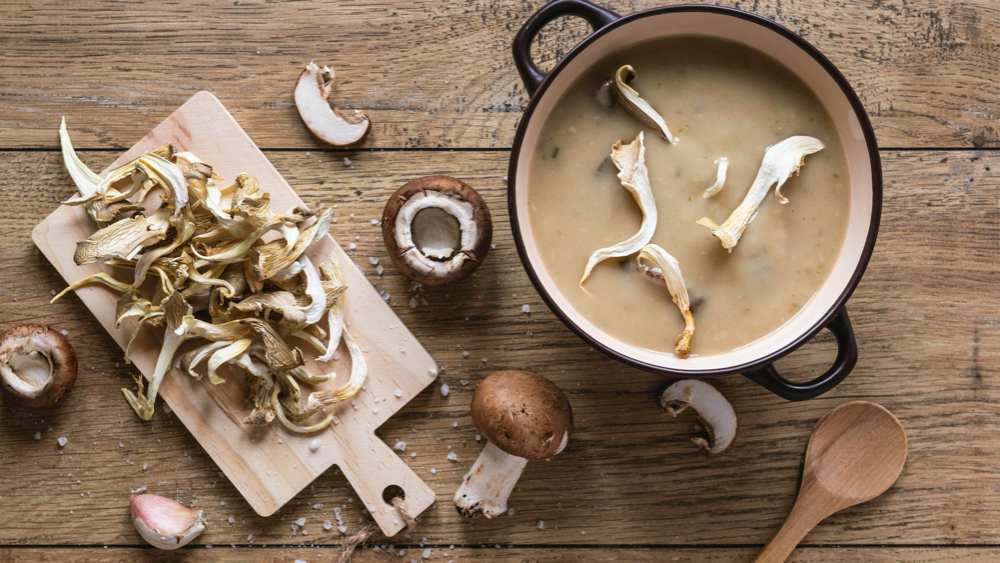- Fast results
- 4,000+ locations
- 4.8 star rating
Need Help? (888) GET LABS



The information in this article is not intended to replace professional medical advice, diagnosis, or treatment. Instead, consult your physician or any licensed healthcare providers if you have questions.
For centuries, mushrooms have been used in traditional medicine practices. The health benefits of these versatile fungi cannot be ignored. From boosting immunity to improving brain function, mushrooms provide a natural and nutrient-rich addition to your diet. Read on to learn more about the exceptional advantages of mushrooms.
Mushrooms aid in strengthening your immune system by supplying your body with antioxidants and beta-glucans that fortify your body’s defense mechanism against pathogens. This allows you to minimize your risk of contracting diseases.
Beta-glucans, a type of soluble fiber, in particular, have been found to stimulate the activity of immunity cells, which include natural killer cells and macrophages. This activity allows these cells to better fight infections and diseases.
| Pro tip: Aside from mushrooms, many other organic foods can help boost your immune system. Read about them in our guide about infection prevention, where we detail essential information that will help you protect your health from infectious pathogens. |
Antioxidants in mushrooms, such as ergothioneine and selenium, facilitate the neutralization of detrimental free radicals in the body, effectively diminishing oxidative stress – a detrimental event resulting from the imbalance between antioxidants and free radicals. Oxidative stress is closely linked to cancer and other progressive health problems like Alzheimer’s disease.
Mushrooms specifically contain a unique antioxidant called ergothioneine, which is not commonly found in other foods. Ergothioneine has been shown to have strong antioxidant properties and may play a role in protecting against oxidative stress and inflammation. Shiitake and oyster mushrooms, in particular, contain a high concentration of this antioxidant.
Sodium levels in mushrooms are naturally low, which ensures optimum control of blood pressure and reduces the risk of heart disease. They are also rich in potassium, which helps balance the fluids and electrolytes in your body. As a result, your blood vessel walls relax, allowing better blood flow and lowering your blood pressure.
Another advantage of eating mushrooms is the absorption of its concentrated dietary fiber, which helps lower cholesterol levels and improve blood lipid profiles. Both are vital factors in maintaining cardiovascular health.
| Pro tip: Your risk of developing cardiovascular disease depends on many factors, including your lifestyle, family history, and pre-existing medical conditions. However, as you get older, the risk increases in general, which is why undergoing heart health screening becomes imperative. |
Research has shown that certain types of mushrooms can potentially enhance brain health and cognitive function. A study published in Biomedical Research showed the beneficial effects of Lion’s mane (Hericium erinaceus), a type of edible mushroom, on the brain.
Lion’s mane mushrooms contain compounds known as hericenones and erinacines, which evidently stimulate the production of nerve growth factor (NGF). Nerve cells rely on NGF for growth, maintenance, and survival. Boosting NGF production may help improve memory, enhance cognition, and potentially reduce Alzheimer’s risk.
Reishi mushrooms also showed impressive cognitive effects. They are known to contain bioactive compounds called triterpenes, which have been shown to have neuroprotective effects. Cognitive decline may be prevented, and brain health improved through these compounds.
Mushrooms contain low fat and calories, making them ideal for losing weight. Their high fiber content also helps fill you up quickly and reduce your appetite. Additionally, fiber regulates digestion and prevents constipation. Therefore, incorporating mushrooms into your meals can help you increase your fiber intake and support a healthy digestive system.
If you’re adopting a vegetarian or vegan diet, you’ll be pleased to learn that mushrooms contain significant protein levels. Protein plays an important role in the growth of muscles, as well as the repair of tissues. While natural sources mainly include animal food products, mushrooms are great plant-based protein sources.
| Pro tip: If you’re thinking about giving up meat, make sure your body adjusts accordingly to avoid the health risks of going vegan, such as nutrient deficiencies. Consider taking a vegan/vegetarian profile test to help you acquire the necessary baseline health data. |
Outside sunlight, mushrooms are one of the few edible sources of vitamin D. When exposed to ultraviolet (UV) light, mushrooms can synthesize vitamin D, just like human skin. By placing mushrooms in direct sunlight or using UV lamps, the vitamin D content can be significantly increased.
If you don’t get enough sun or have trouble absorbing vitamin D from other sources, eating mushrooms rich in vitamin D can help you get enough.
| Pro tip: Vitamin D deficiency should not be ignored as it could impact your bone health and increase your risk of heart disease. Find out how to spot the symptoms of insufficient vitamin D and the necessary steps for proper diagnosis. |
Mushrooms act as prebiotics that stimulate the growth of good bacteria in the gut. Keeping the microbiome in good balance is the hallmark of healthy digestion. The compounds and long-chain carbohydrates called polysaccharides found in mushrooms promote a healthy gut microbiota population. This provides better protection against infections and digestive issues.

Mushrooms come in many different types, each with its own flavor and health benefits. Let’s explore some of the most popular varieties and their specific advantages:
Shiitake mushrooms contain umami flavor and immune-boosting properties. They also have a compound called lentinan, which has been shown to have anti-tumor effects and enhance immune function.
The oyster mushroom is a good source of antioxidants and dietary fiber. Furthermore, it contains vitamins B3 and B5, which are vital for energy metabolism and red blood cell production.
Maitake mushrooms are prized for their anti-cancer properties. They contain high levels of beta-glucan, which has been shown to stimulate the immune system and inhibit tumor growth.
The chanterelle mushroom has a meaty texture and a delicate flavor. It is a renowned source of vitamin C, which aids in immune function and collagen synthesis.
Due to their large size and robust flavor, portobello mushrooms are popular for grilling or stuffing. Weight watchers will find them a great option since they are low in calories and fat.

Yes, mushrooms are classified as superfoods due to their many health benefits and rich nutrients, including antioxidants, protein, vitamins, and minerals. Mushrooms also possess the potential to combat chronic and progressive disorders like cancer and dementia, as well as the ability to help regulate gut microbiomes.
No one mushroom is considered superior to the others. However, some of the most common mushrooms with exceptional health benefits include the Lion’s mane, Reishi, Oyster mushrooms, Shiitake, and Maitake. These mushrooms help boost immunity, improve cognitive functions, and contain anti-cancer properties.
It’s generally okay to eat edible mushrooms every day, considering their numerous health advantages. However, it’s essential to check if you have any allergic reactions when eating mushrooms before deciding to add these fungi to your daily diet. Also, consult your nutritionist or healthcare provider for a more tailored meal plan that includes mushrooms.
Mushrooms are some of the most accessible and affordable superfoods you can include in your diet. They provide numerous health benefits, from aiding in weight management to boosting your immunity, and can be prepared in various ways. Plus, they go with many types of dishes anyone can enjoy, expanding the advantages of eating mushrooms to your palate.

© Copyright 2025 Personalabs. All Rights Reserved.